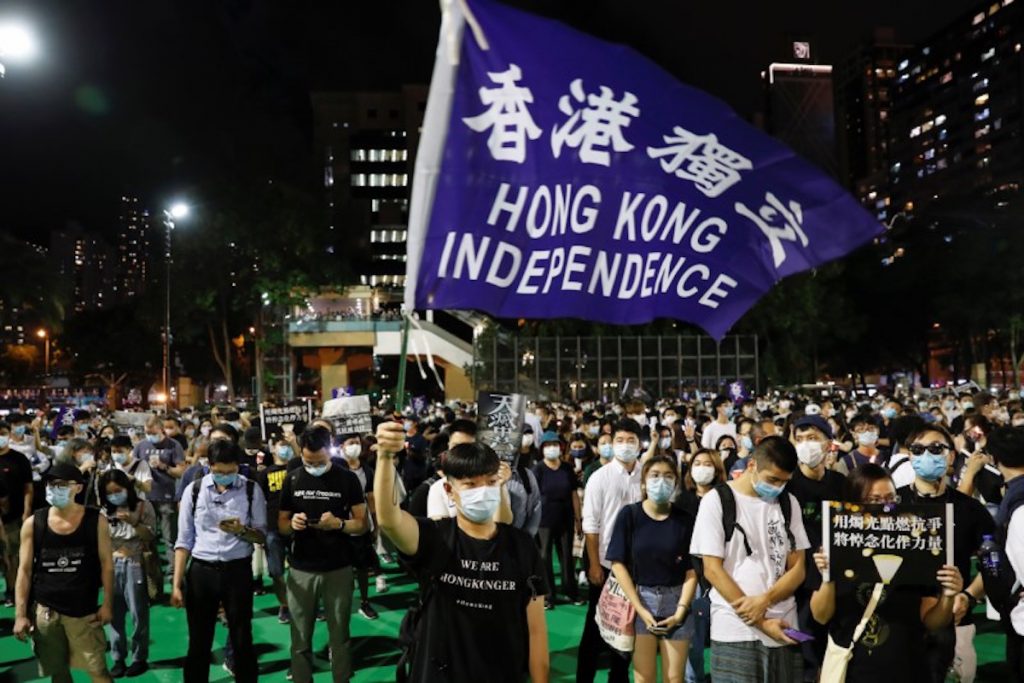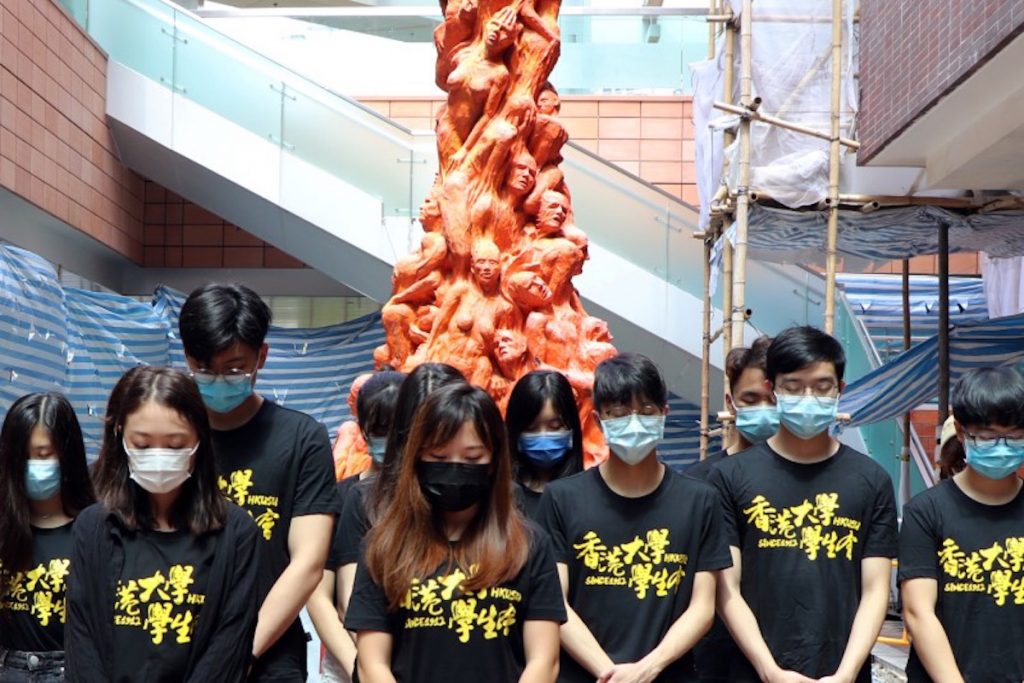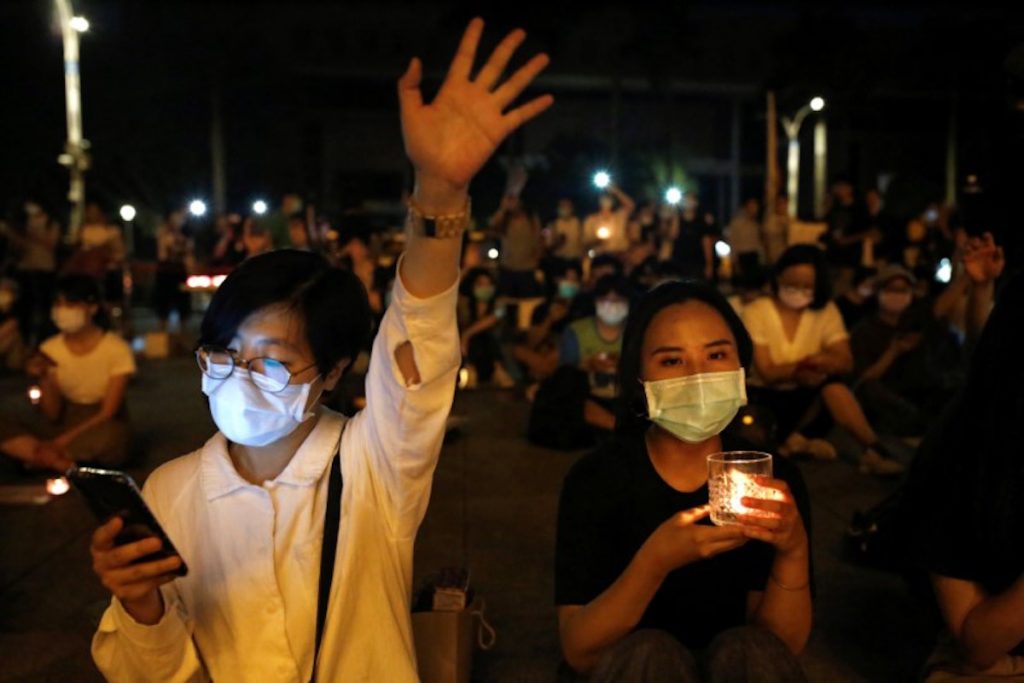Police pepper-sprayed some Hong Kong protesters on June 4 who defied a ban to stage candlelight rallies in memory of China’s bloody 1989 Tiananmen Square democracy crackdown, accusing Beijing of stifling their freedoms too.
Scuffles broke out briefly in the working-class Mong Kok area where hundreds had gathered, and some demonstrators tried to set up roadblocks with metal barriers, prompting officers to use spray to disperse them, according to Reuters witnesses.
It was the first time there had been unrest during the annual Tiananmen vigil in Hong Kong, which police had prohibited this year citing the coronavirus crisis.
Several protesters were arrested, police said.
Earlier, a few thousand people joined a peaceful main rally in Victoria Park, many wearing masks and chanting slogans such as “Liberate Hong Kong, revolution of our time” and “Fight for freedom, stand with Hong Kong.”
“We are just remembering those who died on June 4, the students who were killed. What have we done wrong? For 30 years we have come here peacefully and reasonably, once it’s over it’s ‘sayonara’ (goodbye),” said Kitty, a 70-year-old housewife.
The anniversary has struck an especially sensitive nerve in the former British-ruled city this year after China’s move last month to impose national security legislation and the passage of a bill outlawing disrespect of China’s national anthem.
It also comes as Chinese media and some Beijing officials voice support for protests in the United States against police brutality.

In Beijing, security around Tiananmen Square, a popular tourist attraction in the heart of the city, appeared to be tightened, with more police visible than on ordinary days.
June 4 commemorations are banned in mainland China.
In Hong Kong, which just reported its first locally transmitted coronavirus cases in weeks, police had said a mass gathering would undermine public health.
But many took to the streets to light candles and stand for a minute’s silence. Seven Catholic churches opened their doors. Some people held photos of the 1989 events, including a famous one of a man standing in front of a tank convoy.
Millionaire publishing tycoon Jimmy Lai and Democratic Party founder Martin Lee, who were both arrested in April over protests last year, left a church service together.
“We are afraid this will be the last time we can have a ceremony, but Hong Kongers will always remember what happened on June 4,” said Brenda Hui, 24, in Mong Kok, with a white battery-illuminated umbrella that read “Never Forget June 4.”

Western solidarity
The European Union and United States both expressed solidarity with the Hong Kong demonstrators’ desire to mark the Tiananmen anniversary.
Democratically-ruled and Beijing-claimed Taiwan, where more than 500 people gathered in Liberty Square, asked China to apologise, which the mainland called “nonsense.”
“In China, every year has only 364 days; one day is forgotten,” Taiwan President Tsai Ing-wen wrote on her Facebook page. “I hope that in every corner of the earth there won’t be any days that are disappeared again. And I wish Hong Kong well.”
China has never provided a full account of the 1989 violence. The death toll given by officials days later was about 300, most of them soldiers, but rights groups and witnesses say thousands of people may have perished.

There was no mention of the anniversary in Chinese state media. But Hu Xijin, editor of the Global Times, a nationalistic tabloid published by the ruling Communist Party’s People’s Daily, tweeted a screenshot of the U.S. statement with his own commentary.
“The Tiananmen incident gave Chinese society a political vaccine shot, which has enabled us to be immune to any color revolution. 31 years later, riots emerged and spread in the U.S. They only think of exporting it, but forget to prepare vaccine for themselves.”
Hu did not elaborate. The term color revolution is often used to describe peaceful uprisings in former Soviet states but has also been used to describe other popular movements.
In Hong Kong, officials have repeatedly said a ban on groups larger than eight is a public health measure with no political motivation.
Earlier on June 4, some students in Hong Kong followed the annual tradition of repainting a Tiananmen memorial message on a university campus bridge: “Souls of martyrs shall forever linger despite the brutal massacre. Spark of democracy shall forever glow for the demise of evil.”






